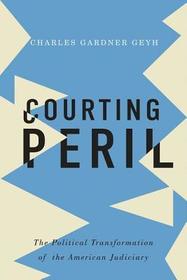
Courting Peril
The Political Transformation of the American Judiciary
-
10% KEDVEZMÉNY?
- A kedvezmény csak az 'Értesítés a kedvenc témákról' hírlevelünk címzettjeinek rendeléseire érvényes.
- Kiadói listaár GBP 76.00
-
36 309 Ft (34 580 Ft + 5% áfa)
Az ár azért becsült, mert a rendelés pillanatában nem lehet pontosan tudni, hogy a beérkezéskor milyen lesz a forint árfolyama az adott termék eredeti devizájához képest. Ha a forint romlana, kissé többet, ha javulna, kissé kevesebbet kell majd fizetnie.
- Kedvezmény(ek) 10% (cc. 3 631 Ft off)
- Kedvezményes ár 32 678 Ft (31 122 Ft + 5% áfa)
Iratkozzon fel most és részesüljön kedvezőbb árainkból!
Feliratkozom
36 309 Ft

Beszerezhetőség
Megrendelésre a kiadó utánnyomja a könyvet. Rendelhető, de a szokásosnál kicsit lassabban érkezik meg.
Why don't you give exact delivery time?
A beszerzés időigényét az eddigi tapasztalatokra alapozva adjuk meg. Azért becsült, mert a terméket külföldről hozzuk be, így a kiadó kiszolgálásának pillanatnyi gyorsaságától is függ. A megadottnál gyorsabb és lassabb szállítás is elképzelhető, de mindent megteszünk, hogy Ön a lehető leghamarabb jusson hozzá a termékhez.
A termék adatai:
- Kiadó OUP USA
- Megjelenés dátuma 2016. március 3.
- ISBN 9780190233495
- Kötéstípus Keménykötés
- Terjedelem216 oldal
- Méret 160x236x25 mm
- Súly 431 g
- Nyelv angol 0
Kategóriák
Rövid leírás:
In recent decades, the American judiciary has undergone a political transformation that jeopardizes the rule of law paradigm that the courts have embraced for centuries. Courting Peril describes that transformation, explores its implications, and proposes a new way of thinking about the courts and their oversight.
TöbbHosszú leírás:
The rule of law paradigm has long operated on the premise that independent judges disregard extralegal influences and impartially uphold the law. A political transformation several generations in the making, however, has imperiled this premise. Social science learning, the lessons of which have been widely internalized by court critics and the general public, has shown that judicial decision-making is subject to ideological and other extralegal influences. In recent decades, challenges to the assumptions underlying the rule of law paradigm have proliferated across a growing array of venues, as critics agitate for greater political control of judges and courts. With the future of the rule of law paradigm in jeopardy, this book proposes a new way of looking at how the role of the American judiciary should be conceptualized and regulated. This new, "legal culture paradigm" defends the need for an independent judiciary that is acculturated to take law seriously but is subject to political and other extralegal influences. The book argues that these extralegal influences cannot be eliminated but can be managed, by balancing the needs for judicial independence and accountability across competing perspectives, to the end of enabling judges to follow the "law" (less rigidly conceived), respect established legal process, and administer justice.
Geyh wades into the age-old question of how best to select and retain state court judges. It is a divisive issue that arises whenever there are judicial scandals or court decisions on which the citizenry is deeply divided. Geyh presents an invaluable analysis of the pros and cons of each system and defuses many of the traditional arguments for and against systemic change. A must-read for those interested in preserving public confidence in our state court judiciaries.
Tartalomjegyzék:
Acknowledgements
Introduction
Chapter 1: The Rule of Law Paradigm in a Changing Landscape
Chapter 2: The Changing Academic Understanding of American Courts
Chapter 3: The Rule of Law Paradigm's Popular Antecedents
Chapter 4: The Legal Culture Paradigm
Chapter 5: Conceptualizing the Dimensions of Judicial Oversight
Chapter 6: Explanations and Prescriptions





